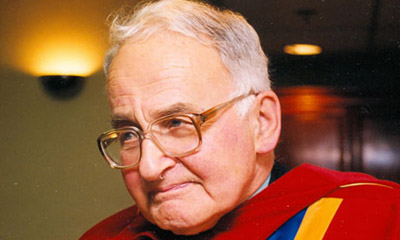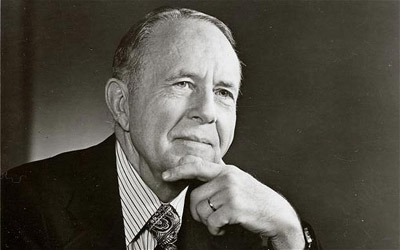
Peter Newmark
Peter Newmark, who has died aged 95, took the lead in making translation an academic study in its own right. He developed translation theory in striking and sometimes controversial ways, describing the conversion of a text from one language to another as both a science and an art.
Central to both ways of looking at it was the idea of engagement in a truth-seeking activity: "Translation is concerned with moral and factual truth. This truth can only be effectively rendered if it is grasped by the reader, and that is the purpose and the end of translation." Thus the translator is an agent with moral responsibilities, and Newmark emphasised "the role of translation as a political weapon that can and must be used to defend human rights and to favour understanding and peace".
While some writing in this field, which is related to comparative linguistics, semantics and socio-linguistics, can be very dry, Newmark always enlivened what he had to say with practical examples. His publications ranged over three decades, from Approaches to Translation (1981) to the chapter on linguistic theories of translation that he contributed to the Routledge Companion to Translation Studies (2009).
He was also an indefatigable champion of language learning, arguing for government recognition, resources and commitment, and had an influential role in the Chartered Institute of Linguists, of which he became president. A driving force behind the development of vocationally oriented language teaching programmes, in 1967, together with Anthony Crane, he launched the first postgraduate diploma in technical and specialised translation in the UK, at the Polytechnic of Central London (now the University of Westminster).
Born in Brno, in the Czech republic, Newmark had an English father who ran a successful textiles business. He was educated amidst "the frightful conventionality", as he put it, of Rugby school.
At Cambridge University, he came under the influence of the literary critic FR Leavis. His French tutor was Anthony Blunt. A brief convert to communism, Newmark was a Labour party supporter until 2002, when the government decided to remove the requirement to teach foreign languages from the post-14 school curriculum.
During the second world war he served with intelligence in the 8th Army in Italy. Sent to interpret the German surrender at Bolzano, he spent the evening with German officers in a villa talking about German Romantic poets. The next morning the surrender was duly signed. Newmark ordered three extra bottles of champagne for the interpreter-general, and to his surprise, they were promptly delivered.
Postwar teaching led to his time in the 1960s as head of modern languages at Holborn College of Law, Languages and Commerce. The college amalgamated with the Polytechnic of Central London, from which he retired as dean of languages in 1981.
Until earlier this year Newmark was visiting professor at the University of Surrey, and he was a frequent lecturer abroad. He loved classical music, theatre and all kinds of literature and poetry. A dedicated supporter of Amnesty International, he was also passionate about the cause of Palestine.
He is survived by his wife, Pauline, his daughters, Clare (from a former marriage) and Liz, a son, Matthew, and four grandchildren.
• Peter Newmark, teacher and writer, born 12 April 1916; died 9 July 2011
Source:guardian.co.uk



نظر